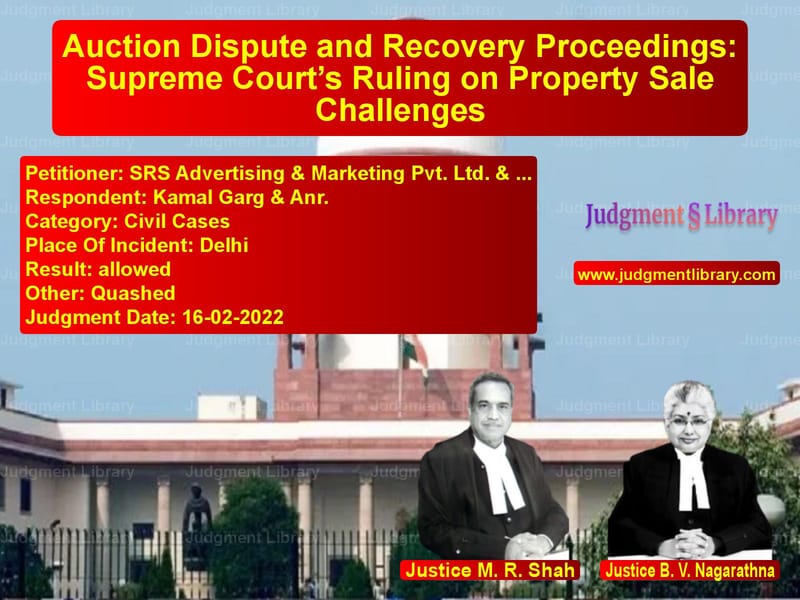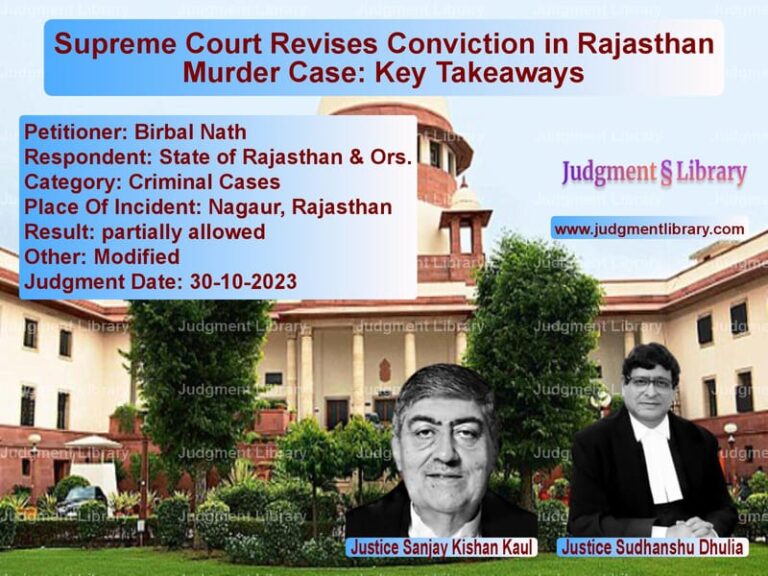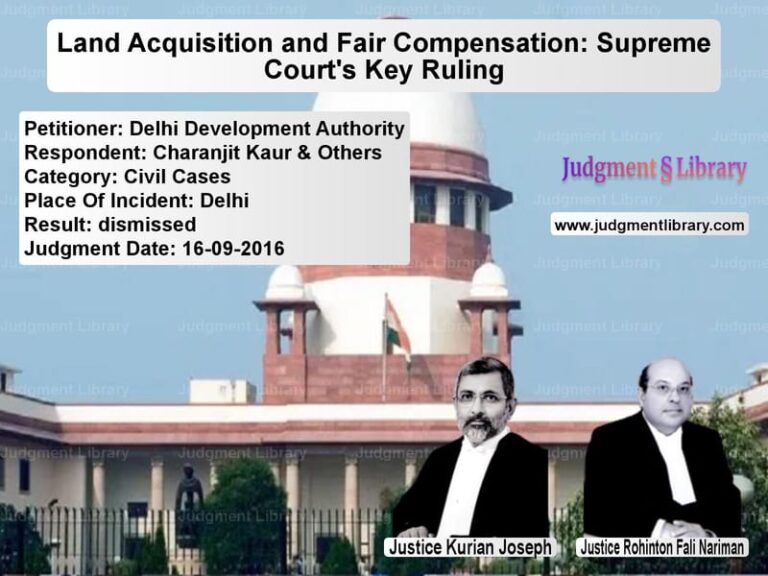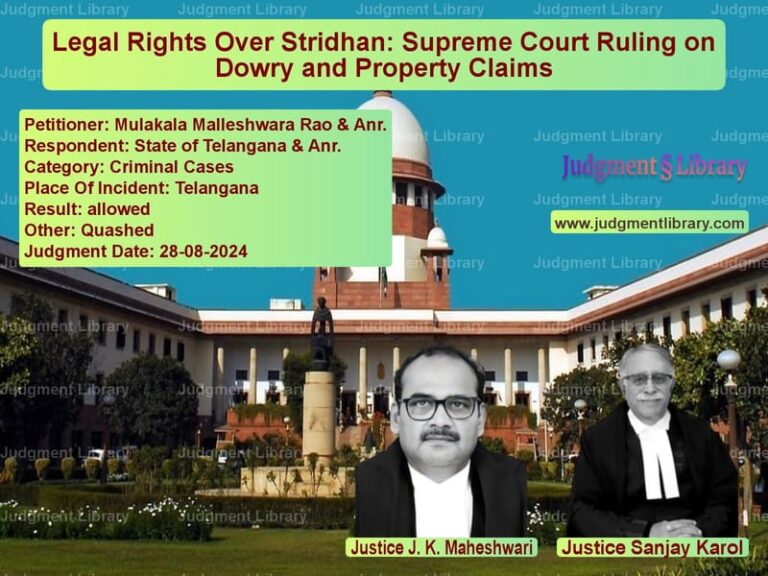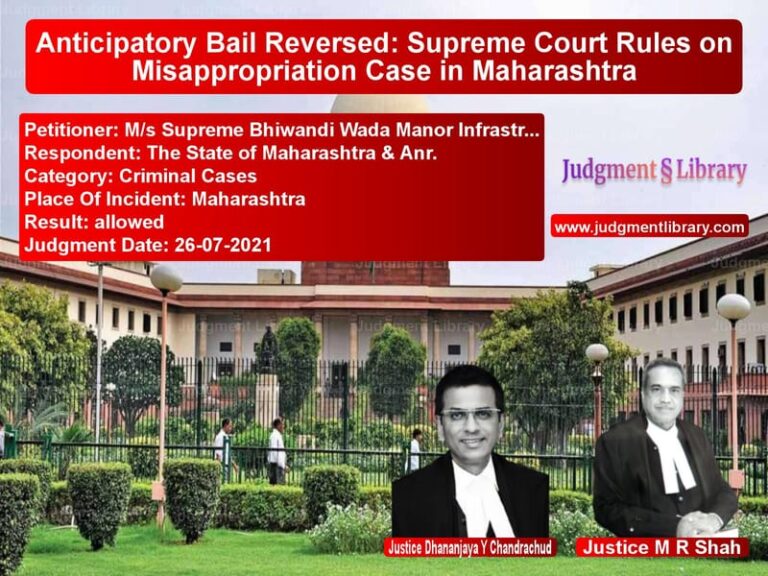Auction Dispute and Recovery Proceedings: Supreme Court’s Ruling on Property Sale Challenges
The case of SRS Advertising & Marketing Pvt. Ltd. & Ors. vs. Kamal Garg & Anr. is a significant ruling concerning auction proceedings, recovery of dues, and the role of courts in intervening in disputes arising from financial transactions. The Supreme Court examined whether the High Court exceeded its jurisdiction by passing an order that affected an ongoing appeal before the Debt Recovery Appellate Tribunal (DRAT).
The dispute arose when properties were auctioned following a recovery certificate issued in favor of Corporation Bank (now merged with Union Bank of India) for Rs. 85 lakhs. The respondent, Kamal Garg, was the highest bidder but later raised concerns, leading to forfeiture of part of his deposit. The matter went through multiple legal stages, including the Recovery Officer, the Debt Recovery Tribunal (DRT), the DRAT, and finally, the Supreme Court.
Background of the Case
The key events leading to the Supreme Court judgment are as follows:
- A recovery certificate was issued for Rs. 85 lakhs in favor of Corporation Bank.
- Properties were put up for auction with a reserved price of Rs. 54 lakhs.
- The respondent, Kamal Garg, made the highest bid of Rs. 85 lakhs.
- After depositing Rs. 21.25 lakhs (25% of the bid price), he sought clarity from the Recovery Officer.
- The Recovery Officer dismissed his application and forfeited 10% of his deposit.
- The respondent challenged the forfeiture before the DRT, which upheld the Recovery Officer’s decision.
- The matter was taken to the DRAT, where an appeal was pending.
- The respondent approached the High Court for interim relief, which led to the present Supreme Court case.
Legal Dispute Over the High Court’s Decision
The High Court of Delhi granted relief to the respondent by allowing him additional time to deposit the balance amount along with damages of Rs. 5 lakhs. The High Court directed:
“[We] grant one opportunity to the petitioner to deposit the balance amount along with damages quantified at Rs. 5 lakhs, within the next two weeks. The deposit shall be made with the respondent bank within the aforesaid period. In case, the deposit is made in these terms, the respondent bank shall proceed to deliver the possession of the properties to the petitioner.”
This decision effectively resolved the dispute before the DRAT, making the ongoing appeal redundant. The original borrower (appellant) challenged this decision in the Supreme Court.
Arguments Before the Supreme Court
Appellant’s Arguments
The appellant’s counsel contended that:
- The High Court exceeded its jurisdiction by passing an order that preempted the DRAT’s decision.
- The matter was still pending before the DRAT, and the High Court should not have intervened.
- By allowing the respondent additional time to deposit the balance amount, the High Court altered the terms of the auction.
- The High Court’s order rendered the DRAT proceedings meaningless, bypassing the proper appellate process.
Respondent’s Arguments
The respondent’s counsel argued:
- The High Court’s order provided an equitable solution to prevent injustice.
- The respondent was willing to fulfill his obligations and had already deposited a substantial amount.
- The forfeiture of his deposit was unfair given the circumstances.
- The bank would suffer no loss if he was allowed to complete the transaction.
Supreme Court’s Judgment
The Supreme Court ruled in favor of the appellant, setting aside the High Court’s order. The key findings of the Court were:
- The High Court exceeded its jurisdiction by passing an order that interfered with an ongoing appeal before the DRAT.
- The proper forum to decide the matter was the DRAT, and the High Court’s intervention made the appeal redundant.
- The High Court should have confined itself to the issue of interim relief instead of granting final relief.
- The High Court’s decision to allow additional time for deposit effectively altered the auction terms, which was beyond its scope.
The Supreme Court observed:
“The High Court has exceeded in its jurisdiction by passing the impugned judgment and order. By doing so, it has made the proceedings before the DRAT infructuous, as after the impugned judgment and order, nothing further is required to be decided by the DRAT.”
Key Observations from the Judgment
- The High Court’s role in such cases should be limited to interim relief and not final adjudication.
- The DRAT was the appropriate forum to decide the matter on its merits.
- Allowing the respondent to deposit the balance amount with damages effectively modified the terms of the auction.
- The Supreme Court directed the DRAT to decide the matter within four months.
Conclusion
This ruling clarifies the scope of judicial intervention in financial recovery cases and auction disputes. The Supreme Court emphasized the importance of allowing specialized appellate tribunals, such as the DRAT, to handle disputes without unnecessary interference from High Courts.
The judgment reinforces the principle that judicial forums must respect procedural hierarchy and ensure that appeals are decided at the appropriate level. This decision serves as a precedent for ensuring that High Courts do not overstep their jurisdiction in matters where specialized appellate bodies are already handling the case.
Petitioner Name: SRS Advertising & Marketing Pvt. Ltd. & Ors..Respondent Name: Kamal Garg & Anr..Judgment By: Justice M. R. Shah, Justice B. V. Nagarathna.Place Of Incident: Delhi.Judgment Date: 16-02-2022.
Don’t miss out on the full details! Download the complete judgment in PDF format below and gain valuable insights instantly!
Download Judgment: srs-advertising-&-ma-vs-kamal-garg-&-anr.-supreme-court-of-india-judgment-dated-16-02-2022.pdf
Directly Download Judgment: Directly download this Judgment
See all petitions in Debt Recovery
See all petitions in Contract Disputes
See all petitions in Judgment by Mukeshkumar Rasikbhai Shah
See all petitions in Judgment by B.V. Nagarathna
See all petitions in allowed
See all petitions in Quashed
See all petitions in supreme court of India judgments February 2022
See all petitions in 2022 judgments
See all posts in Civil Cases Category
See all allowed petitions in Civil Cases Category
See all Dismissed petitions in Civil Cases Category
See all partially allowed petitions in Civil Cases Category

